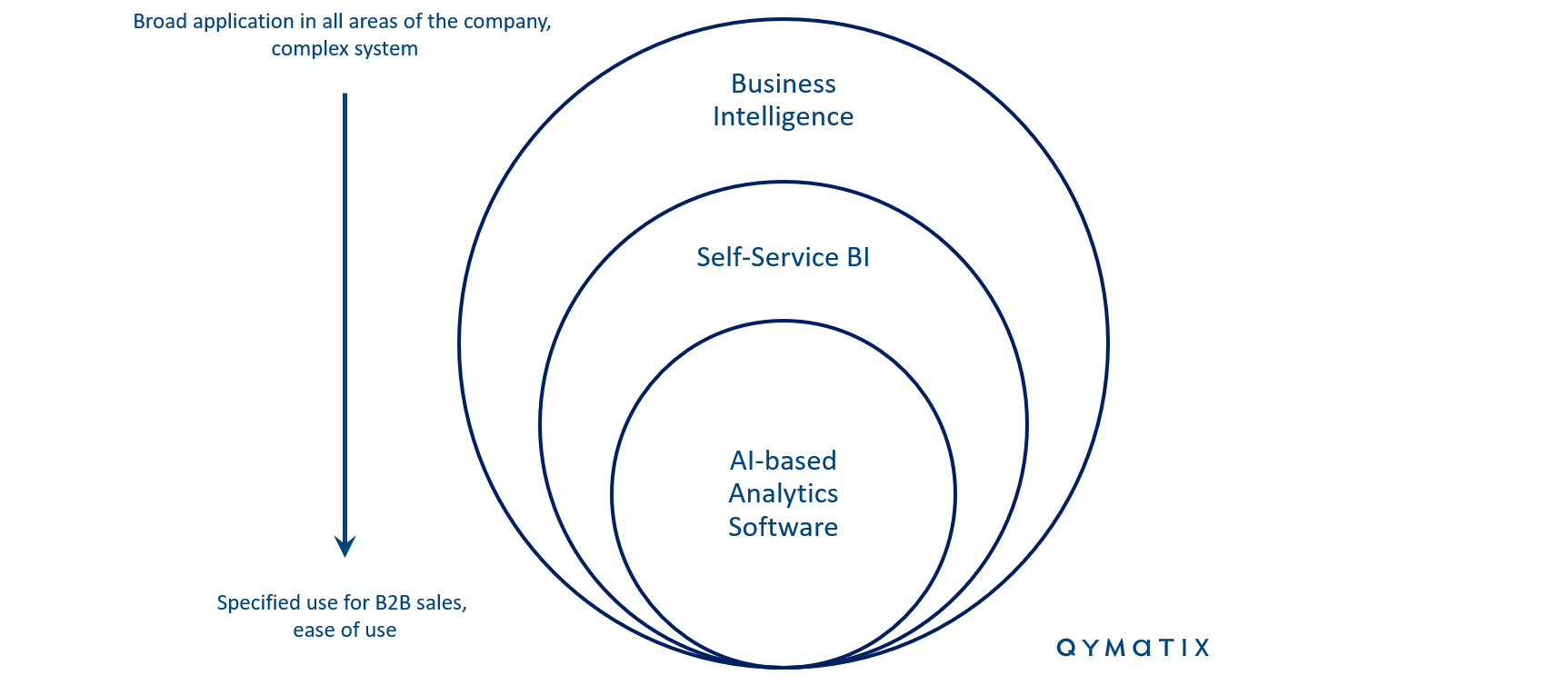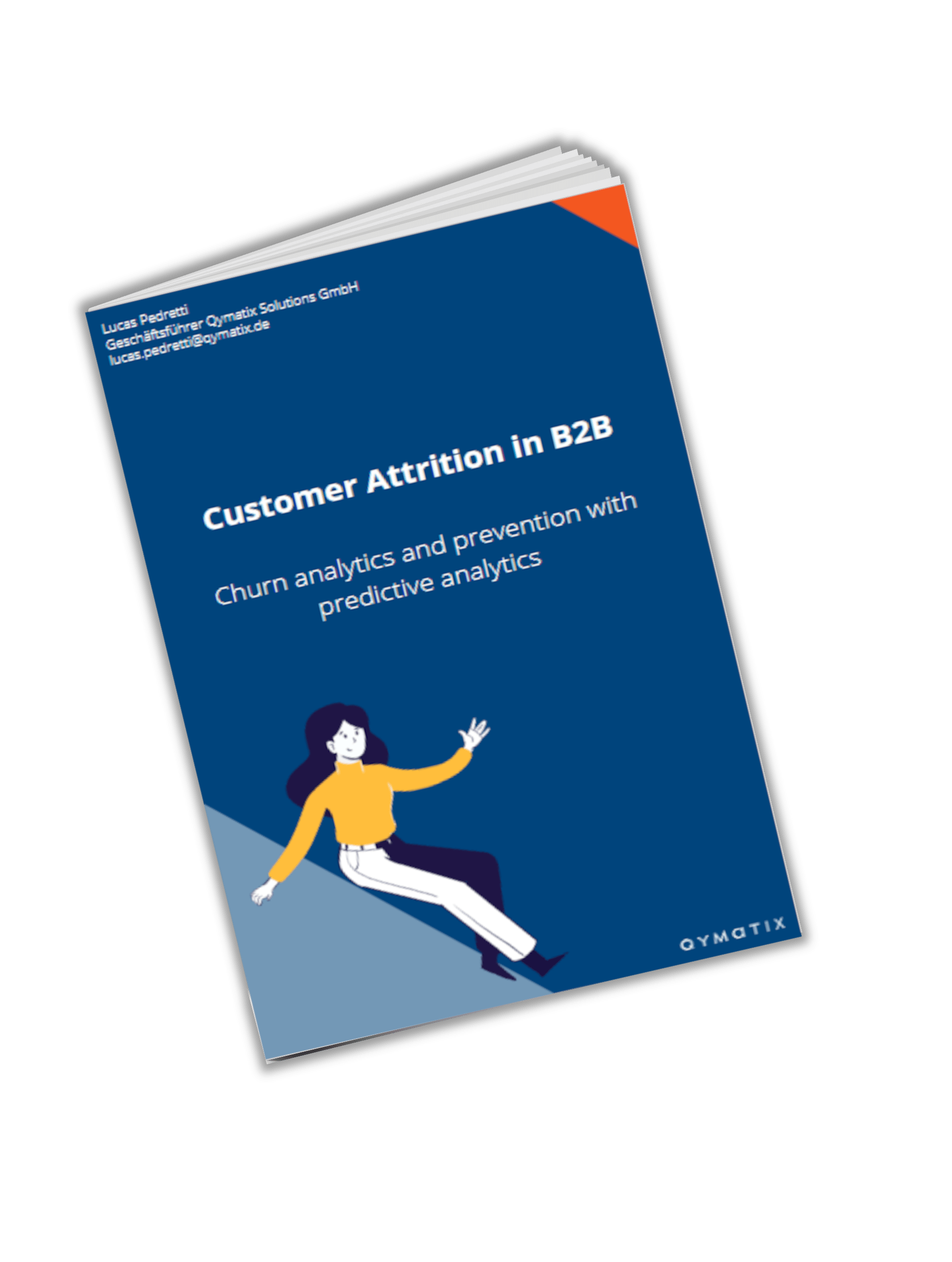The difference between Business Intelligence (BI) and Self-Service BI and why Qymatix Predcitive Sales Software is not a traditional Self-Service BI solution.
2018 said Carlie J. Idoine, Research Director at Gartner:
“The trend of digitalization is driving the demand for analysis in all areas of modern business and administration.”
That’s right. Not only large companies and big players, but also more and more SMEs have recognised the value of data analysis: Data-supported decisions to achieve corporate goals.
And this is precisely the purpose of BI applications. BI systems collect data, process it, analyze and visualize it.
In the early days of BI (around 1990), the use of such software was considered an enormous competitive advantage. Today – in times of Big Data – it is instead a prerequisite to remain competitive. In the last 30 years, the world has changed, and so have the requirements of companies for data analysis software.
Not only top management decides based on data, but every department wants individual analyses that fit its own departmental goals. Thus, the path from BI to self-service BI to Qymatix is opening up.
Let us take a closer look at and discuss the three applications.
Business Intelligence
BI is not just software; it is a whole and complex system that spans the entire management and executive level. Through such a system landscape, you want to merge and link all enterprise data from operative systems. Avoiding the so-called data-silos enables comprehensive cross-departmental evaluations.
The advantages of BI systems are unmistakable: IT specialists can create very comprehensive analyses adapted according to requirements. A modern BI solution should merge different data sources and support equal access to analytics across the entire organization.
Only when a BI solution can access separate data sources and make them available to users (or BI consumers) is the system suited properly to support strategic and operative management.
However, most modern BI systems are so complex that they can only rely on internal IT-specialists, with in-depth knowledge of statistics and data management. Additionally, no longer only upper management demands data analytics, but each department according to their specific criteria. The need to equal access to analytics across the company, and the increasing complexity of BI system result in longer waiting times for set-ups, configurations and access to information.
Of course, the costs also play a role. High development, advancement and personnel costs arise during the implementation and operation of such a complex system.
Self-Service Business Intelligence
Self-Service BI (SSBI) compensates the main disadvantage of comprehensive BI systems: It enables users to create reports and analyses themselves, without the help of an IT specialist.
So SSBI relieves IT departments of workload and departments can perform department-specific analyses themselves. You don’t have to wait until “someone from IT” finds time for it.
SSBI programs, such as Tableau, Qlick or Power BI from Microsoft, advertise with intuitively operated analysis and visualisation tools, for which you don´t need profound technical knowledge. Since Microsoft Office is indispensable in companies and generally known, many SSBI providers orientate themselves towards Excel and Access like functions.
However, the same applies here: The analyses still have to be created by someone. Not by IT, but within the own department and also not so complicated anymore – nevertheless it has to be done.
And who doesn’t know this, you are dealing with Excel (or similar spreadsheet programs) every day, and suddenly some function doesn’t work as it should. Of course, you did it at the end of the day, but it took a fair amount of time and nerves.
No matter how intuitive the SS BI applications are and how much similarities they have to common tools like Excel, it will always take time to perform in-depth data analysis.
For finance departments, this is probably a no-brainer. They juggle with numbers and data, nonetheless, and the employees enjoy it.
In sales, however, the situation is usually different. The real passion here lies in customer communication and interaction. Of course, every salesperson knows that customer data contains essential information and that data analysis is very important for preparing customer meetings or other communication measures. Reports and studies are a somewhat necessary evil in sales departments.
HOW CAN PREDICTIVE SALES SOFTWARE WORK FOR ME?
Artificial intelligence-based, automatic analytics software
The weaknesses detailed above are the reason for the advent of artificial intelligence-based, automatic analytics software, such as the Qymatix Predictive Sales Software. Furthermore, in the case of Qymatix, the software is specifically tailored to B2B sales, further specialization in an increasingly fragmented sales AI software market.

However, Qymatix cannot be seen as a traditional self-service tool, because by artificial intelligence and machine learning, an algorithm creates the data analyses by itself. Sales Managers can see the results on dashboards in the CRM system and receive concrete recommendations for action, such as “Watch out for customer X, Y and Z. They might migrate.”
Qymatix has specialized precisely on the needs in B2B sales and uses predictive analytics concerning four particular fields of application.
Pricing Analytics: The pricing analyses reveal contradictions and optimization possibilities at an early stage. Thus, pricing potentials per customer can be determined, which gives your sales team negotiating security in price negotiations.
Churn Risk Prediction: With the help of an extended prognostic analysis function, Qymatix can point out customers who are more likely to churn in the future.
This application of machine learning regarding customer churn helps you to prevent “hard” and “soft” customer churn. Especially when you have to keep an eye on many customers and products.
Cross-Selling: Using artificial intelligence, Qymatix creates a detailed shopping cart analysis based on your ERP and CRM sales data.
Qymatix Predictive Sales Analytics uses a set of data mining methods to determine and predict the probability of future cross-selling in your customer database.
Lead Scoring: Effectively processing incoming leads and prospects is the most critical aspect of B2B sales. Without intelligent pipeline management, you quickly waste time and money by chasing leads that are not yet ready for closure.
CALCULATE NOW THE ROI OF QYMATIX PREDICTIVE SALES SOFTWARE
Business Intelligence vs. Self-Service-BI vs. AI-based Software – Summary
The opening statement by Carlie J. Idoine ends as follows:
“Rapid advances in artificial intelligence, the Internet of Things, and SaaS (cloud) analytics and BI platforms make it easier and less costly than ever for non-specialists to perform effective analysis and better inform their decision-making”.
This statement can be applied 1:1 to the development of BI, SSBI and Qymatix because this path represents a continuous specialization on individual departmental requirements.
BI is a complex system across the entire company. No analysis is too complicated for this system, and it requires capable IT specialists to use it.
SSBI software is designed simpler, and each department can create its analyses.
Qymatix is a specialist in B2B sales and its individual goals. If you implement the software, sales managers immediately get concrete results and recommendations for action — no need for creating reports anymore.
I WANT TO SEE HOW PREDICTIVE SALES SOFTWARE WORKS
Free eBook for download: Churn analytics and prevention with predictive analytics
Managing and reducing customer attrition is an essential task of a sales manager. Sadly, sales executives often overlook customer churn in practice.
Download the free eBook now.
- We will use this data only to contact you for discussing predictive sales KPIs. You can read here our declaration on data protection.

Further Read:
Goram, M. (2017): Embedded Analytics versus Business Intelligence Ed.: Computerwoche
Litzel, N. (2016): Was ist Business Intelligence – BI? Ed.: Big Data Insider
Also interesting about BI:
